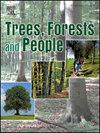Degradation of mangrove forests in the Sundarbans: An assessment based on perspectives of mangrove resource collectors using the DPSIR framework
IF 2.7
Q1 FORESTRY
引用次数: 0
Abstract
Mangrove forests provide vital ecosystem services to communities in tropical countries, yet they are susceptible to degradation. The causes and effects of mangrove forest degradation in the Sundarbans of Bangladesh have not been thoroughly investigated. This study aimed to explore these issues from the perspective of mangrove resource collectors (MRCs). Utilizing the DPSIR (Driver, Pressure, State, Impact, and Response) framework, data were collected through in-depth interviews and focus group discussions with MRCs. The findings revealed that the drivers of mangrove degradation included reduced freshwater supply, increased demand for mangrove resources, climate change, and tourism. These drivers created pressures on the mangrove forests, manifesting through natural disasters, rising salinity levels, the establishment of the Farakka barrage, forest fires, coastal development, overexploitation, and pollution. Consequently, the forests experienced alterations in cover, a decline in mature trees, reduced stem density, and changes in species composition. The impacts of this degradation included biodiversity loss, diminished ecosystem services, and adverse effects on the livelihoods of communities dependent on mangroves. MRCs highlighted the necessity for support in generating alternative incomes, restoring freshwater supply, addressing the Farakka barrage issue collaboratively, enhancing forest management practices, and promoting mangrove afforestation and reforestation. These findings carry significant implications for policy reform, research, sustainable management, and conservation efforts for mangrove forests. They also underscore the need for developing alternative livelihood programs for communities living around the Sundarbans and other tropical regions facing similar challenges.
孙德尔本斯红树林退化:基于DPSIR框架下红树林资源收集者视角的评估
红树林为热带国家的社区提供重要的生态系统服务,但它们容易退化。孟加拉国孙德尔本斯红树林退化的原因和影响尚未得到彻底调查。本研究旨在从红树林资源收集者(MRCs)的角度探讨这些问题。利用DPSIR(驱动、压力、状态、影响和响应)框架,通过深入访谈和与mrc的焦点小组讨论收集数据。研究结果表明,红树林退化的驱动因素包括淡水供应减少、对红树林资源需求增加、气候变化和旅游业。这些因素给红树林带来了压力,表现为自然灾害、盐度上升、法拉卡拦河坝的建立、森林火灾、沿海开发、过度开发和污染。因此,森林经历了覆盖度的变化、成熟乔木的减少、茎密度的降低和物种组成的变化。这种退化的影响包括生物多样性丧失、生态系统服务减少以及对依赖红树林的社区生计的不利影响。mrc强调了在创造替代收入、恢复淡水供应、合作解决法拉卡大坝问题、加强森林管理实践以及促进红树林造林和再造林方面提供支持的必要性。这些发现对红树林的政策改革、研究、可持续管理和保护工作具有重要意义。他们还强调,有必要为孙德尔本斯和其他面临类似挑战的热带地区周边社区制定替代生计计划。
本文章由计算机程序翻译,如有差异,请以英文原文为准。
求助全文
约1分钟内获得全文
求助全文
来源期刊

Trees, Forests and People
Economics, Econometrics and Finance-Economics, Econometrics and Finance (miscellaneous)
CiteScore
4.30
自引率
7.40%
发文量
172
审稿时长
56 days
 求助内容:
求助内容: 应助结果提醒方式:
应助结果提醒方式:


